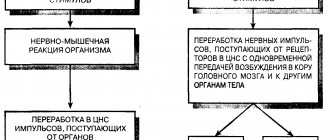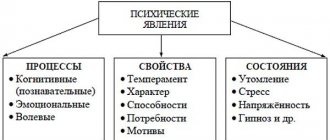Each of us has the ability to direct attention inside our being, to be aware of our thoughts, states, moods and sensations. With this ability we can see ourselves from the outside. In addition, this ability has important practical significance, because it serves as a means of complete and effective self-analysis, allowing you to evaluate your own thoughts, actions and actions, analyze them and change them. This ability is called reflection.
What is reflection as a mental process?
The term “reflection” (with the emphasis on the second syllable) comes from the Latin word reflexio, which means “reflect”, “turning back”.
Czeslaw Mirsky
In psychology, there is an opinion that a personality can only be considered fully developed if the boundaries of his own “I” are clear to the individual.
Reflection is studied by several sciences, each of which gives its own definition of this phenomenon. In the scientific understanding, this is the ability to critically evaluate scientific research, as a result of which the truth is found.
In psychology, reflection is an individual’s ability to:
- focus on your thoughts;
- analyze your behavior;
- evaluate your actions;
- understand your feelings and emotions;
- be critical of yourself.
According to Pierre de Chardin, reflection presupposes the presence of knowledge about oneself and its awareness.
The authors of the psychological dictionary define this phenomenon as a thought process when a person gets to know himself by analyzing his feelings, experiences, behavior and various states.
Socrates wrote the words “Know thyself!” This slogan was written on the wall of the temple and became a call for human exploration. Despite the fact that the concept of reflection is the subject of study in several sciences, it is most often used in philosophy and psychology.
Concept of self-reflection
Self-reflection is often identified with reflection. This is partly true. The difference between the concepts is that the prefix “self” indicates a reflection of oneself, and not just the external world, events and other people.
Self-reflective people constantly listen to their own feelings and emotions and try to analyze them. Such exercises are very useful for understanding your own self, personal desires and needs. How often do we focus on the expectations of other people, looking for an assessment of our actions from the outside. As a result, one’s own dreams and internal needs remain unfulfilled.
Young people enter training in prestigious professions, and their souls are drawn to creative delights. As a result, the profession does not bring satisfaction, but the parents are happy! A person lives an uninteresting life, suppressing existing talents.
There is another side. In hypertrophied cases, a person constantly listens to emotions. He becomes fixated on personal experiences and becomes neurotic, not seeing the outside world, which is beautiful. A person stops enjoying life, constantly analyzing his own condition.
In this case, it is important to get out of yourself in time, take a deep breath, feel material things: table, floor, wall, hands, feet, sounds and smells.
Many people are wary of their own body signals. Often, excessive reflection leads to neurotic diseases, for example, hypochondria (a pathological condition in which we find ourselves with all possible and impossible diseases).
Cases have been recorded when women find all the signs of pregnancy, and only the results of repeated laboratory examinations (for example, ultrasound) can dissuade them from this. Of course, if you suspect a disease, you must undergo a medical examination. But when a person realizes that his fears are far-fetched, he should move away from focusing on personal feelings and ignore them.
Forms
The nature of the manifestation of this phenomenon determines its form. Depending on what area of a person’s mental activity his consciousness is directed to during this mental process, the following forms of reflection are distinguished:
- Personal. Understanding and assessing the inner world of a person: ideals, capabilities, needs and motives.
- Logical. Analysis and assessment of everything related to thinking processes, memory and attention; important for the learning process.
- Interpersonal. Assessing relationships between people in different situations, analyzing one’s social activities, and the causes of conflict situations.
- Cognitive. Analysis of the content and level of acquired knowledge; broadening your horizons, assessing your own professional skills and career development opportunities.
- Social. The ability to be aware of the attitude of others towards an individual, as a result of which he can adjust his behavior.
The principle of reflexivity
The described term as a productive parameter of the reflection process is either a personality property or a characteristic of an entire social community, for example, persons with higher education. The term is also relevant and applicable in other sciences. So, for example, examples in computer science - as the ability of a program to monitor and transform its structure during execution, in economics - the theory of reflexivity, authored by J. Soros, is applicable, or as the concept of relationships in mathematics. Thanks to the works of V. Lefebvre, the term reflection was isolated from philosophy into the interdisciplinary sphere and concepts such as reflexive system and management were introduced, which are at the border of many sciences: sociology, mathematics, psychology, philosophy, ethics.
Thus, in the psychology of work activity and engineering psychology, diagnostics of the level of development of reflexivity of thinking and communication is carried out. This is necessary to determine the level of readiness for work.
A person’s professional development occurs simultaneously with the maturation of his personality. It is personal growth that gives impetus to professional growth through a deeper understanding and through the experience gained.
The principle of reflexivity is to rethink the experience of individual existence. The starting position in the formation of individuals’ beliefs is the reliance on individual experience as a semantic, emotional and experimental basis.
The internal experience of experience is not only consciously realized, since there is necessarily an aspect called “awareness”. Such an understanding, naturally, is not lacking in emotionality, passion, and interest, which play a significant role in achieving awareness. Experience provides a source for reflection.
Based on the experiences gained in a past existence, a person develops his own biased position towards moral principles and norms, and forms an individual field of spiritual meanings. Therefore, reflexivity must be considered in the context of internal comprehension of individual experience.
The principle of reflexivity implies the subject’s turning to the analysis of his own experience, identifying the spiritual meanings of activities, behavioral patterns, and communication.
The described principle in moral education requires that means and organizational forms be methods of self-awareness, and on this basis – both self-realization and self-determination. It implies an attitude towards comprehension and mutual understanding as a necessary and sufficient condition for humanity and the effectiveness of forms, means and methods of education.
For the most part, reflection covers what is happening to the individual, the lesson that he learned from what happened, and how he subsequently uses the knowledge and skills acquired as a result of the experience.
Reflection as a principle of thinking, directing it towards comprehension and awareness of individual forms and prerequisites, contributes to the acquisition of new understanding, assessment and justification of one’s own attitudes. The ability to reflect allows you to achieve adequate self-esteem, predict future life activities, and analyze its results.
The role of reflection in psychology and everyday life
Czeslaw Mirsky
Every person needs reflection. This helps to achieve heights in the profession and interaction with people around you.
In life, it is important to learn to adequately evaluate yourself and strive to become better. Knowing your strengths and weaknesses makes it easier to adapt to different life situations.
For example, if a person knows that he can be unrestrained, but wants to make a good impression and become a better person, he will try to avoid conflict situations by working on himself. There are different ways to do this: visit a psychotherapist, read books on psychology, take trainings.
This necessary mental process performs important functions:
- Cognitive. The desire to study yourself and analyze your actions. This function helps form the self-concept in the individual’s mind.
- Developmental. Transforms personality, creates settings for personal growth and development of abilities.
- Regulatory. Helps regulate your behavior, improve your character, and get rid of vices.
- Meaning-creative. With the help of such a function, a person meaningfully performs any action and can explain the meaning of his actions.
- Design. Creating perspective based on analysis of past actions for the purpose of self-improvement.
- Educational. Makes it possible to control the level of your knowledge and regulate the educational process in terms of mastering new material.
What to do if self-reflection is absent
The process of self-reflection is common to everyone, but to varying degrees. It depends on the psychotype, personality traits, various life priorities, and the general level of mental and intellectual development.
People with a high intellectual level are often more prone to self-reflection.
However, there are cases when self-reflection is absent. What is the reason for this phenomenon and what to do in this case?
- Lack of education. The child does not receive the necessary information about what is good and what is bad. In the worst case, the child is shown virtually no generally accepted behavior patterns. The child is not interested. In this case, you cannot do without qualified psychological help. It is necessary to systematically allocate 15 minutes to analyze the events that occurred during the current day.
- Overprotectiveness. The child is literally smothered with care and love. In this case, there is no need to be aware of your behavior. The child does not comprehend the skills and abilities to change his line of behavior, which haunts him in adulthood. The method of dealing with this problem is similar to the previous one. The work should also be carried out with the help of a qualified psychologist.
- Pedagogical neglect. In this case, no one is involved in raising the child. This is the highest point of defective education. This problem must be dealt with through psychological counseling. Moreover, it must be eliminated in childhood. As an adult, this is quite difficult.
- Extraversion. Excessive sociability, often turning into intrusiveness and talkativeness. In this case, it is necessary to focus a person’s attention on the benefits of self-reflection: prospects for productive communication, establishing social connections.
Ability to reflect
The question whether every person has such an ability cannot be answered in the affirmative. But it is quite possible to develop such a quality in yourself. According to A.V. Karpov, if an individual can recreate and analyze his own or others’ thoughts, highlight key points and their sequence in a statement, and then objectify them, then he has developed this psychological attitude.
What actually affects a person’s ability to reflect? This:
- ability to find a way out of difficult situations;
- ability to solve important life problems;
- desire to rethink your behavior.
Gender approach
There is a theory of a gender approach to the process of reflection. According to this stereotype, it is implied that women are more prone to reflection than men, and this is supposedly due to the more subtle mental regulation of the weaker sex. This controversial claim has no scientific evidence to support it.
There are a number of observations by psychologists who note different manifestations of reflection in representatives of different sexes.
Thus, it has been found that women with a low level of reflection are more inclined to defend their own interests to the detriment of the interests of others. Simply put, low-intellectual, non-reflective female individuals are more scandalous and have a more quarrelsome character. Whereas reflective female representatives prefer to find a compromise and get away from a scandal than to be involved in a conflict.
A reflective man, on the contrary, in a conflict situation acts as a fighter defending his interests. Men with a minimal indicator of reflection will demonstrate adaptive, opportunistic behavior in a conflict situation.
So, to summarize the above, we can say with confidence that to reflect means to be a person who thinks, feels, and analyzes. This property of human nature distinguishes us from other representatives of the living world, and it is this property that can bring the human personality to a new, qualitatively different level of development.
Stages of development
Czeslaw Mirsky
The development of many human abilities begins in early childhood. Reflective activity is no exception.
The first stage begins at approximately 3 years of age. At this age, the child begins to recognize himself as a subject of activity and tries in every possible way to prove this to adults. He is just beginning to learn the new rules of life in society. But so far he can neither evaluate his actions nor analyze them. Self-criticism is not yet available to him.
The second stage covers the period of study in primary school and partly in middle school (from 6 to 10 years). At this time, the child actively learns and masters the skills of self-analysis and social reflection.
The third stage - the age from 11 to 15 years is considered adolescence. This is the period when children begin to be critical of themselves: they are dissatisfied with their appearance and level of knowledge acquisition. The nervous system of adolescents is characterized by instability, which is expressed in excessive emotionality and mood swings. It is at this age that it is especially important for adults to support their child. This contributes to the adequate development of reflection skills.
The fourth stage is adolescence, it lasts from 16 to 20 years. Boys and girls of this age fully demonstrate the ability to objectively assess their activities. This ability improves with accumulated experience as new activities are mastered.
Interesting test
To confirm that a person has the ability to direct thoughts to someone else’s consciousness, we will present one of the well-known tests.
Three test takers are shown the details: 3 black and 2 white caps. Then they put blindfolds and black caps on them. At the same time, they report that any of them can wear either a black or a white cap on their head.
Then the bandages are removed, and the test takers are given the following task:
- Raise your hand if you see at least one black cap;
- Leave the room if you guess which cap you are wearing.
As a result, everyone immediately raises their hand, but then there is a delay. Eventually, someone leaves the room.
This is where reflection regarding someone else’s thinking manifests itself: “Am I wearing a white cap?”, “No, if he were white, then one of the other two participants would see that the third was stretching out his hand, since he sees the black cap only on himself. But then he would go out, but he sits. So I’m wearing a black cap!”
The unique ability to reason for two other participants at once helped them guess the color of the cap. The one who came out first has more developed reflexivity than others.
Development in adults
This deficiency can occur at any age. Adults realize what they are missing. For example, the ability to restrain oneself in critical situations or manage time correctly. You can improve your skills. But this is daily work on yourself. You need to be prepared for this.
If an adult decides to improve himself, he must understand what exactly he wants and why he can’t do it. Finding the cause of failure is half the battle. After the theoretical part, you can begin the practical part.
Make it a daily ritual in the evenings to analyze your behavior during the day, as well as your thoughts and feelings. It is useful to keep a notebook where you can write down all the positive and negative moments of your day.
By transferring experienced negative feelings into a notebook, you can get rid of fears or doubts. By analyzing each stage of the day, you can adjust your further actions if the situation is similar.
It is useful to try to restore an unpleasant situation in your thoughts. But its ending should be different - changed for the better. It is also important to evaluate your positive qualities and actions, praising yourself for them. But this must be done without fanaticism, otherwise you can “catch a star” and become a “narcissist.”
Why does a person need self-reflection and what does it give?
Self-reflection is necessary for the following reasons:
- Provides the basis for self-learning. In the absence of the ability to reflect, personality does not develop. In some cases, this may indicate psychopathology.
- Gives you the opportunity to reevaluate your point of view; it is the basis of socialization. Allows you to assimilate the norms and values of society.
Lack of reflection
If a person has problems with thinking, perception of the world around him and himself in it, then they say that he lacks reflection. In this case, he may perceive the environment as a danger to himself and try by all means to protect himself from everyone and everything. Often such people become closed to their loved ones. Attempts by other people (relatives, psychologists, teachers) to help them fail.
Sometimes a person may feel empty and depressed. He becomes passive, detached from the outside world. He lacks all interests and motives.
In modern pedagogy there is an opinion that a person with absent reflection cannot be a full-fledged subject of the learning process. Therefore, in this case, it is impossible to talk about personality-oriented education and training. In this regard, the problem of paying attention to the development of children’s ability to reflect even from elementary school is acute.
What does it mean to reflect?
Reflect
- is to think, to think logically, to analyze actions and actions, to know oneself.
Is it worth understanding your personality? Of course yes. If a person has not understood himself, he is led by others and lives someone else’s life. Low self-esteem, complexes, and feelings of guilt sit deep inside and interfere with further development. They need to be found and neutralized.
By reflecting, we learn:
- Think rationally.
- Stop mental “garbage”.
A low level of self-analysis is the path to making the same mistakes and blunders throughout your life. At the everyday level, the concept of a reflective person is often associated with such definitions as: “to be nervous”, “to worry”, “to worry too much”. Therefore, in any action, moderation and reasonableness are important.
It is necessary to approach your inner world soberly and calmly, without allowing emotions to overwhelm the arguments of reason. A person who knows how to reflect is his own psychoanalyst; not everyone is capable of this.
In order to “self-examine” for the benefit of your business, you need to avoid the following mistakes:
- You should think about the motives for your actions, not the actions themselves
. For example, a husband who cheated on his wife may realize his betrayal and vow not to do it again. But if a man does not understand what pushed him to cheat, no force will stop him from repeating the mistake, since the motives for the need to go “to the left” will remain undeveloped. - "Saw sawdust"
, as D. Carnegie said. This means constantly grinding past sins and failures in your head, coming up with possible other consequences of what has already happened. What was is no longer there, think about the current moment, make plans for the future.
- Cultivate a sense of guilt
. Yes, we made a mistake, but we got our lesson for it. There is no point in berating yourself for something that cannot be fixed. Everything is not without sin.
- Responsible for the whole world
. Processes in the world occur against our will. We should not take responsibility for something we cannot influence.
If you follow the rules outlined, then reflection is not only possible, but also useful.
What I have diligently collected, bit by bit, over many years of continuous psychotherapy (thanks to my once very non-random, although predominantly intuitively chosen therapists, supervisor, teachers and mentors), and which I now constantly and confidently use in everyday life, in my opinion, it is impossible to obtain through books.
I'm talking about the ability to reflect. In order not to delve into abstruse terms, I will try to explain this concept more simply.
In essence, reflection is a person’s ability to consciously direct attention deep into oneself, observe one’s mental space, focusing on the inner content.
On Wikipedia, for example, you can read that reflection distinguishes humans from animals, and it is thanks to it that a person can not only know or feel something, but also know about his knowledge or experience. This is the ability to track what is happening at different levels of consciousness, with the possibility of further rethinking.
Having originated in philosophy, the concept of reflection expanded over time. As a psychologist, the formulation closest to me is that of psychoanalyst, Doctor of Sciences A.V. Rossokhin. He describes personal reflection as “an active subjective process of generating meaning, based on the unique ability of the individual to become aware of the unconscious.”
Children have practically no reflection. Childhood is a time of affect, impulse, so to speak, a time of immediate reaction or, if it is stopped, for some reason being inaccessible, then an unconscious adaptation to reality through mental defense mechanisms.
No self-observation has yet developed in the child’s psyche, since the ability to reflect “matures” precisely in contact with an accessible Other, and then can develop throughout life if a person is interested and does not suppress this opportunity.
Unlike animals and small children, a person is mentally mature and has sufficiently developed reflection, capable of independently learning and organizing self-knowledge in contact with everyone and everything he encounters.
Thanks to this developed property, he becomes able not to react affectively, but to observe, track the emergence of one or another of his feelings, states, and explore them, asking all sorts of questions about himself, his individual “structure” and the situation that gives rise to such a reaction.
It can detect cause-and-effect, temporal, spatial and other connections (in fact, thanks to connection, integrity is achieved).
And therefore, for an adult, everything until the end of his life can be an Unlimited Fount, a Teacher, and with this approach, a meeting with any creature will bestow this person with new facets of knowledge of “himself-in-the-world.”
Thanks to reflection, a person gradually introverts, his personal picture gains depth, facets and possibilities appear that he had not previously discovered in himself.
Against the background of the above, psychotherapy is a so-called transitional space in which people who are not yet capable or little capable of reflection have the opportunity to acquire and develop it to the extent that over time the need for therapy will disappear, and the person, having received an invaluable the ability to “psychotherapeutize” everything around, thus becoming able to extract useful understanding and appropriate life experience.
However, of course, as always, writing about this is easier than going through the path of developing awareness.
For example, a person coming from trauma, having structural personality disorders (any borderline or psychotic level) or diagnosis will most likely have a more difficult time reaching this ability, and therefore will probably take longer than, for example, a neurotic client (and probably not with one therapist).
Reflection develops in contact with the present and reflective Other. People who come to therapy in a difficult mental state cannot rely either on this fact or on their experience of themselves in contact.
They don't know how to do this because no one taught them. And besides this deficiency, their past experience speaks either of the absence of an interested loved one, or of the danger, the actual lethality of the Other, who finds himself in close proximity. Therefore, these clients cannot bear the reflection, nor even the very possibility of being perceived, and therefore their impulse arises to distance themselves and close themselves off from the person sitting opposite (the therapist), who creates a “threat” to self-recognition with his presence.
I recently came across one valuable statement online about the predominance of perception over representation (reproduction of what is perceived):
“People with psychosomatic functioning overinvest in perception, which inhibits or interrupts thinking. Sometimes this can be detected directly during a session, when the patient, instead of walking through his inner world, begins to listen to sounds, noises from the outside, look at the wallpaper in the office, etc. Patients resort to perception in order to stop the painful representation.”
It is clear that a person who is in extreme pain, feels bad and does not like to discover in the depths of himself those experiences that are hidden there, is quite painful, scary, ashamed and anxious to be close to the Other. All of this can potentially be experienced again. I say “again” because these are traces of past events that have already occurred and have preserved in the depths of the unconscious difficult experiences blocked and not processed by the psyche.
It is quite understandable that a person who has long ago suffered unbearable suffering for him is primarily drawn to control, monitor the therapist, manage, examine him, check and analyze him, attack him with questions or bombard him with personal judgments and assessments - in general, do anything, thus running away from oneself, outside. After all, choosing to study with a therapist, looking at the walls or your palms, in extreme cases, is much safer than studying the internal, mental world order, from meeting which a threat can certainly come in the form of reproduced and previously unbearable mental pain.
Having violations in almost all areas: personal structure, thinking, perception, emotional-volitional and behavioral spheres, such clients will need time and a certain, so to speak, habit of the fact that there is no threat for them in the office (this is the topic of the Ethics of a Psychotherapist), they will need “ attachment" to the therapist, so that there is still an opportunity to get to reflection, sooner or later.
After all, first in the therapy space, a decent amount of time is spent on adaptation, all kinds of automatic reactions, as well as the abundant use of protective mechanisms characteristic of a person in everyday life and manifestations of this in actions.
Take, for example, night calls (this is a strange phenomenon even for everyday life, isn’t it?). If it is typical for a person to impulsively call someone at any time of the day or night (I’m not talking about force majeure now, that’s something else), sooner or later, but most likely he will call his therapist at an inopportune time.
When trying to talk about this in a session, the client is less disturbed and more tolerant, more accepting of his “imperfect” self, will probably think about it and, most likely, will begin to remember not only how it happened and what happened to him, but will probably be able to do assumptions or will be able to withstand the therapist's interpretations about needs, timing, and roles where this impulse comes from.
That is, this event, this fact can be quite calmly discussed and explored together with the client, bringing it into therapy in order to find an understanding of the unconscious motives and needs that automatically triggered this behavior. To put it simply, where did it come from (not to talk about external circumstances, but to explore internal needs).
This was an example of reflection in progress, where, with the help of the therapist, the client learns to discover and understand himself and trains to do this.
When there is no reflection - precisely due to disturbances in perception, thinking, the predominance of impulse, affects over rational vision, and against the background of all this - naturally! - a prevailing and oppressive feeling of insecurity; - the therapist's attempts to explore what these actions could mean for the client are likely to regard them as persecution, attack, accusation, attack, that is, they will see danger and hostility in the therapist's work itself .
Or he may experience emptiness and observe a complete lack of connections between this event and possible internal motives, which is especially typical for patients with alexithymia. Against this background, any attempt by the therapist to seek an understanding of what is happening is limited to an answer from the series “I don’t know,” “there is nothing.”
Therefore, therapy is a space where this ability can develop, and thanks to reflection, on its basis, many other properties and capabilities of an adult can be built.
As an example, I will give a life situation that is probably familiar to many in order to describe what can manifest itself externally and what happens to a person inside, in his mental reality, in the presence or absence of reflection.
Let's take a queue. Viscous, slow moving. But definitely for some important reason, which is theoretically possible to do without, but would not be desirable (withdraw money from the bank, issue a foreign passport, get advice from an important specialist who came for one day, in general, anything).
So, many people have probably found themselves in similar circumstances and seen how differently people behave in them.
Someone, upon discovering a line, will decide to abandon his intention and goal, will not want to stand or will not be able to take the time, will turn around and leave. Among those whose intention to get what they want still prevails, people will also manifest themselves differently.
There is often someone who is extremely annoyed and does not try to hide it. Such people usually tend to react emotionally, explosively, throwing out all their dissatisfaction and intolerance outwardly (at best, through facial expressions and gestures). As a rule, it is these people who start noisy scandals with someone from the queue, not sparing and smearing the “enemy” from the heart. Or they stubbornly complain and bemoan their fate, quickly finding someone who will “agree” to listen to their incessant complaints. It happens that they find like-minded people among other “victims” who are also dissatisfied and upset, but are not inclined to lead or are not so aggressive.
In such suddenly formed groups, even heated debates can unfold, built on complaints far beyond the specific situation.
There are very responsible citizens who will cope with their discontent through activism and vigorous activity. They are not inclined to “destroy” anything and do not intend to quarrel, but inaction is difficult for them. It is they who usually draw up lists and self-elect in order to establish the order of priority, and then ensure that it is not violated by anyone.
Most people bury themselves in all sorts of gadgets, only occasionally looking up to check the situation. Some will have a snack, read, listen to music or talk on the phone.
There will be those who will begin to motorly relieve tension. More often these are men walking from side to side, pacing the space. There will be others who will look at the interior or study people, observing what is happening around them.
There are also very quiet people, standing on the sidelines and seemingly thinking about something. But this is also an interesting question, because it will not always be a reflection; in most cases, thinking turns into a permanent grinding of obsessive thoughts, mental walking in circles - and this is not any reflection, but rather an obsession.
It is not uncommon to encounter people who react somatically. Without realizing their feelings and experiences, they begin to experience bodily discomfort, even suffering. Someone becomes covered in spots, begins to cough, itch, feel nausea or stomach pain. In older people, blood pressure can often rise, leading to fainting, crises, or even something more serious.
What I described are not reflexive, but rather reflexive, scripted, that is, ways of responding that have already become a habit. In particular, behavior unconsciously organized to cope with one’s aggression.
In short, someone is bubbling and foaming like a boiling pot. Some people avoid unpleasant feelings by distracting themselves in any way possible: eating, listening, thinking, or chatting. Who sublimates by writing satirical poems. Some people engage in reacting through movements, bodily states, or more complexly organized actions.
But the essence is the same: leave, avoid your own “dangerous” experiences, stop contact with your own sensory content.
I suppose that a reflective person could deal with his aggression a little differently. Being able to withstand his different feelings, he would first notice what was happening to him. I would have discovered irritation, or more vividly, downright anger inside myself. Following this, he could already think about what exactly such a reaction arose to.
Having assessed the circumstances (whether there is a real threat to life or not) and made a decision (whether I will stand or not), such a person could begin researching, for example, what exactly is it so difficult for him to bear in this situation?
This is a question not externally, but to oneself, through a volitional effort, organized observation of oneself, as if from the outside. But it is precisely the observation of one’s content, one’s reaction to what is happening, and not judgments about the external, from the series “what monsters everyone is,” “what a terrible state,” “what an unfair world,” “how weak and worthless I am,” or “how viscous time is.” .
It might be interesting to answer the question of what I personally can’t stand right now. Why is this so difficult for me? How does my experience of anger manifest itself outwardly? What is this experience like in my experience? Under what circumstances have I felt this way before? From what earliest period of my life is this memory? How and for what reason can I endure this right now, and without harming myself and those around me?
By asking yourself all sorts of questions, you can pass the time well . And you can study yourself even better, thanks to which it will be possible to build some kind of better contact with the world. Find traces of past experience and build connections with the current situation, as this has the potential to reduce the intensity of anger if it was excessive, completely inappropriate in strength to the situation.
. And you can study yourself even better, thanks to which it will be possible to build some kind of better contact with the world. Find traces of past experience and build connections with the current situation, as this has the potential to reduce the intensity of anger if it was excessive, completely inappropriate in strength to the situation.
For example, this is how a person can reproduce, “remember” some of his very early states and realize that this is his childhood experience. Thanks to symbolic thinking and incoming images, the experience may arise that once in childhood he was very bored and was waiting for his mother. But she still didn’t come, and time dragged on unbearably slowly, and he couldn’t bear it all. And those states of unbearability are very similar to this state of despair that has arisen right now in this queue (and is clearly not symmetrical in charge). Then it may turn out that this situation is not so unbearable. After all, back then he was small and powerless, but now he is an adult, and an adult is quite capable of waiting an hour without killing anyone “as punishment.” Or even two, for the sake of a foreign passport.
I have now given an example of using reflection to cope with anger through the use of more mature, secondary defense mechanisms instead of primitive avoidance. And this is an example typical of an “experienced user” of his inner world, for example, a person who has undergone psychotherapy, or who has trained through other practices that develop awareness.
Naturally, this story can be about any “difficult experience” and the automatic impulse to avoid it, whether it is anger or something else, such as boredom, impatience, indignation, tension, apathy, anxiety, disappointment. If a person comes, finds himself in line, and is fine, we can assume that there is no internal conflict or that it has already been resolved in a way that is successful for the person.
It is important for me to emphasize that the development of reflection is quite accessible (even though it may take some people quite a long time to master it). But when this property of the psyche appears, completely new life horizons open up, the quality of life improves noticeably, and the person himself is able to be self-therapeutic, and not need any specially organized permanent forms of therapy, except perhaps as a hobby, that is, out of interest, and not from the need to be treated and get out of protracted suffering.
Source
Reflexivity as a psychological part of personality
Reflexivity in psychology is a person’s ability to reflect and analyze his own personality, including:
- events that have already occurred;
- actions taken;
- feasible successes or failures;
- current emotional state;
- characteristics of inherent character qualities.
The depth of reflective self-analysis varies from person to person. It depends on the degree of spiritual development of the subject, the level of his self-control, moral qualities, and degree of education. Reflection also clarifies (supports or stops) the ongoing action.
Reflection plays a huge role in the development of personality
For internal harmony, it is important that these concepts are interconnected. This is confirmed by the following facts:
- Reflection without action leads to a person becoming fixated on his own “I.”
- Action without reflection leads to stupid, frivolous and thoughtless actions.
In the field of psychology, reflection is an important key point. Most psychological research is based on reflexology. The study of this phenomenon (its structure, dynamics of development) helps to understand the deep mechanisms of the formation of human personality .
Reflection has always attracted the attention of thinkers, philosophers and psychologists. Aristotle also spoke of this part of human consciousness as “thinking acting on thinking.”
To fully disclose reflexive processes in psychology, this phenomenon is considered from the level of different approaches in research:
- personalities;
- consciousness;
- thinking;
- creativity.










